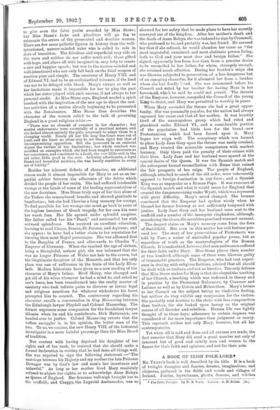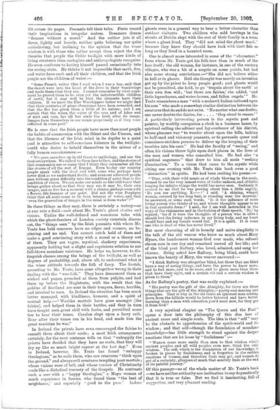A BOOK OF IRISH FOLK-LORE.*
Mn. YEATS'S book is well described by its title. It is a book of twilight thoughts and fancies, dreams, imaginations, and chimeras, gathered in the fields and woods and villages of Ireland. Fairies, leprechauns, ghosts, demons, and witches • The Celtic Twilight. By W. B. Yeats. London : A. H. Male= [Gs.]
flit across its pages. Peasants tell their tales. Poets record their inspirations in irregular metres. Dreamers dream " dreams without a moral." And the author jots it all down, lightly and loosely, neither quite believing nor quite misbelieving, but inclining to the opinion that the truer wisdom is with those who rather accept than reject the dim theories that people the Celtic twilight with more kinds of living creatures than zoologists and anthropologists recognise. He even confesses to having himself passed occasionally into the seeing state. He thinks it not impossible that earth, fire, and water have each and all their children, and that the Irish people are the children of water :—
" Some French writer that I read when I was a boy, said that the desert went into the heart of the Jews in their wanderings and made them what they are. I cannot remember by what argu- ment he proved them to be even yet the indestructible children of earth, but it may well be that the elements have their children. If we knew the Fire Worshippers better we might find that their centuries of pious observance have been rewarded, and that the fire has given them a little of its nature ; and I am certain that the water, the water of the seas and of lakes and of mist and rain, has all but made the Irish after its image. Images form themselves in our minds perpetually as if they were reflected in some pool."
He is sure that the Irish people have more than most people the habits of communion with the Silent and the Unseen, and that the likeness of the Irish mind in its depths to a quiet pool is attractive to self-conscious loiterers in the twilight- world who desire to behold themselves in the mirror of a fully human consciousness :—
" We gave ourselves up in old times to mythology, and saw the Gods everywhere. We talked to them face to face, and the stories of that communion are so many that I think they outnumber all the like stories of all the rest of Europe. Even to-day our country people speak with the dead and with some who perhaps have never died as we understand death ; and even our educated people pass without great difficulty into the condition of quiet that is the condition of vision. We can make our minds so like still water that beings gather about us that they may see, it may be, their own images, and so live for a moment with a clearer, perhaps even with a fiercer, life because of our quiet. Did not the wise Porphyry think that all souls come to be born because of water, and that even the generation of images in the mind is from water' ?"
Be these things as they may, there is certainly a watery—or at any rate a fluid—cast about Mr. Yeats's ghost stories and
visions. Unlike the well-defined and wondrous tales with which the ghost-fanciers of London society entertain diners- out, the "things seen" by the Irish peasants with whom Mr. Yeats has held converse have no edges and corners, no be- ginning and no end. You cannot catch hold of them and make a good convincing story with a moral or a theory out of them. They are vague, mystical, shadowy experiences, apparently holding but a slight and capricious relation to our fall-blown mundane existence. He helps us, however, to dis- tinguish classes among the beings of the twilight, as well as degrees of probability, and, above all, to understand what is the wiser attitude towards the folk of faery. The Scotch, according to Mr. Yeats, have gone altogether wrong in their dealing with the " wee folk." They have denounced them as wicked and pagan, preached at them from pulpits, and had them up before the Magistrate, with the result that the goblins of Scotland are sour in their tempers, fierce, terrible, and inimical to man. In Ireland the situation has been much better managed, with kindliness, humour, and a spirit of mutual help :—" Warlike mortals have gone amongst [the fairies], and helped them in their battles, and they in tarn
have taught men great skill with herbs, and permitted some few to hear their tunes. Carolan slept upon a faery rath.
Ever after their tunes ran in his head, and made him the great musician he was."
In Ireland the priests have even encouraged the fairies to consult them about their souls ; a most Irish arrangement certainly, for the next sentence tells us that "unhappily the priests have decided that they have no souls, that they will
dry up like so much bright vapour at the last day." Even in Ireland, however, Mr. Yeats has found " unhappy-
theologians," as he calls them, who saw creatures " thick upon the ground," and always evil creatures tempting poor mortals ; whose visions were of hell, and whose version of Christianity reads like a diabolical travesty of the Gospels. He contrasts such a seer with a " happy theologian," a Mayo woman of much experience in faeries, who found them " the best of neighbours," and especially " good to the poor." Indoor
ghosts seem in a general way to bear a better character than
outdoor visitants. Two children who sold herrings in the streets of Dublin slept with the rest of their family in a room
where a ghost lived. They "did not mind the ghost much,"
because they knew they should have luck with their fish so long as they lived in a haunted room.
One is almost more interested in some of the " characters " from whom Mr. Yeats got his folk-lore than in much of the lore itself ; the old woman, for instance, in one of the western villages, who was a bit of a sceptic on some points, but had also some strong convictions :—" She did not believe either in hell or in ghosts. Hell she thought was merely an invention
got up by the priest to keep people good ; and ghosts would not be permitted, she held, to go 'trapsin about the earth' at
their own free will; but there are fairies,' she added, and little leprechauns, and water-horses, and fallen angels." Mr.
Yeats remembers a man " with a mohawk Indian tattooed upon his arm " who made a somewhat similar distinction between the creatures that do and do not exist. "No matter what one doubts, one never doubts the fairies, for . . . . they stand to reason: " A particularly interesting person is the mystic poet and painter, by worldly occupation a clerk in a business house, by spiritual calling the adviser and lay-confessor of his district, whose pleasure was "to wander about upon the hills, talking to half-mad and visionary peasants, or to persuade queer and conscience-stricken persons to deliver up the keeping of their troubles into his care." He had the faculty of " seeing," and often his visions threw light upon dark places in the lives of the men and women who consulted him. He had also " a spiritual eagerness " that drew to him all souls " seeking illumination." To a vision that came to the mystic while sitting one evening with Mr. Yeats this book owes a good " distinction " in spirits. He had been reciting his poems :— "They, with their wild music as of winds blowing in the reeds, seemed to me the very inmost voice of Celtic sadness, and of Celtic longing for infinite things the world has never seen. Suddenly it seemed to me that he was peering about him a little eagerly. Do you see anything, X—?' I said. A shining, winged woman, covered by her long hair, is standing near the doorway,' he answered, or some such words. 'Is it the influence of some living person who thinks of us, and whose thoughts appear to us in that symbolic form ? ' I said; for I am well instructed in the ways of the visionaries and in the fashion of their speech. No,' he replied ; for if it were the thoughts of a person who is alive I should feel the living influence in my living body, and my heart would beat and my breath would fail. It is a spirit. It is some one who is dead or who has never lived."
But most charming of all in homely and naïve simplicity is the talk of the old weaver who knew so much about Mary Hynes, the handsomest woman God ever made, who refused eleven men in one day and remained unwed all her life; and of the blind poet Raftery, who loved, admired, and sang her charms. Being asked how Raftery, being blind, could have known the beauty of Mary, the weaver answered :- " I think Eatery was altogether blind, but those that are blind have a way of seeing things, and have the power to know more, and to feel more, and to do more, and to guess more than those that have their sight, and a certain wit and a certain wisdom is given to them."
As for Raftery's poetry, that was easily explained
His poetry was the gift of the Almighty, for there are three things that are the gift of the Almighty,—poetry and dancing and principles. That is why in the old times an ignorant man coming down from the hillside would be better behaved and have better learning than a man with education you'd meet now, for they got it from God."
A very mystical chapter on "The Queen and the Fool" opens a door into the philosophy of this dim lore of ancient races and simple souls. The idea is that "self " may be the obstacle to apprehension of the spirit-world and its wisdom ; and that self—though the foundation of mundane knowledge—has little strength to stand against the deeper emotions that are let loose by " foolishness " :- "Women come more easily than men to that wisdom which ancient peoples, and all wild peoples even now, think the only wisdom. The self, which is the foundation of our knowledge, is broken in pieces by foolishness, and is forgotten in the sudden emotions of women, and therefore fools may get, and women do get of a certainty, glimpses of much that sanctity finds at the end of its painful journey."
Of this passage—as of the whole matter of Mr. Yeats's book —we have neither authority nor inclination to say dogmatically that it is true or false. But we find it fascinating, full of suggestion, and very pleasant reading.







































 Previous page
Previous page